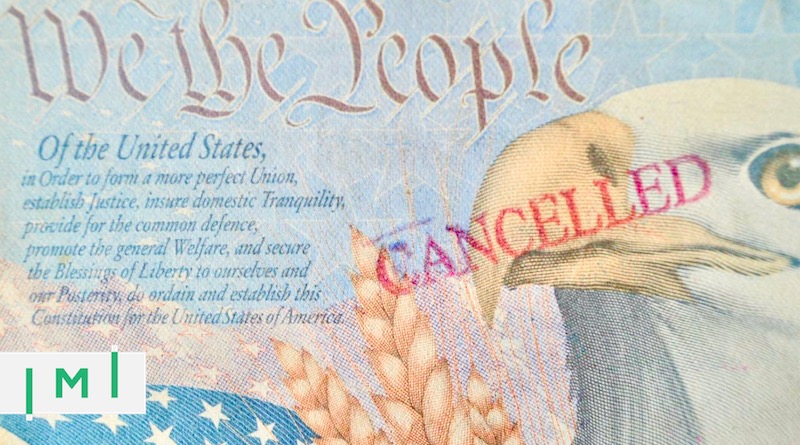Morgan: Don’t Believe Rumors of US Consulates Not Taking Renunciation Appointments
Edwin Morgan claims David Lesperance‘s reports of long waits for US citizenship renunciation appointments are “fictitious” and that IMI, by giving it credence, is spreading misinformation.
For every action, there is a reaction. This law of physical science applies equally to all worldly phenomena, including renunciation of US citizenship. To clarify, forfeiting the citizenship you have held for your whole life is an audacious move that will trigger many future reactions.
The necessary audacity is not hard to muster when easy money is flowing to financial markets. Thanks to lots of easy money from the US government, financial markets only go up (or so it seems). As a result, so does your confidence. For renunciation, this is very helpful because it’s going to take all the audacity you have got the day you take the oath in front of the consular officer.
Have you really thought about the consequences? Because apparently most of you cannot even figure out how to make the appointment. So if you actually figure out how to do it – with a little bit of expert guidance – be careful what you wish for.
Farewell Social Safety Net
Renunciation of US citizenship means no more government handouts. This includes checks received directly from the US government like cash handouts and social security plus indirect benefits such as Obamacare, cheap student loans, timely vaccinations, subsidized home loans, abortion, free public education, and much more.
Additionally, it means living in a scary new world exposed to new rules including amorphous immigration laws that can very quickly put your new dream life in jeopardy e.g. Malaysia’s volatile MM2H program.
Hello Volatility
So much can go wrong even in good times. But what if this volatility happens in unison with a new financial crisis? It is certainly the right time of year for it. *Hint – do an internet search for “Black Friday”.
In addition, the Fed will start tapering soon and interest rates are already at zero with nowhere to go but up. Furthermore, the trillion-dollar infrastructure bill or the $3.5 trillion stimulus bill could fail due to political infighting. The congressional budget approval for FY2022 is also imperiled. What does all this mean?
It means you better make sure your mom hasn’t already changed the lock on the basement door. However, moving back into mom’s basement would be the least of your problems especially if you cannot even get back into the US.
Your shiny new passport will indeed very quickly become just as worthless as the Bitcoin you bought it with (especially if you leveraged it before converting to fiat).
On the Bright Side
Hopefully, my blunt disclaimer does not overshadow the benefits of citizenship by investment. There is no doubt that these programs serve distinct social purposes in the Caribbean countries plus Vanuatu. They are indeed an often overlooked outlet used to correct the colonial crimes that occurred there. As a result, the massive wealth created from centuries of slave trading and commodity theft is starting to trickle back to the scene of the crime.
The huge financial benefits of the citizenship programs pulled these countries through the global pandemic. In addition, the development of tourist infrastructure, medical clinics, schools, sustainable resource development, hurricane relief, and much more is all made possible by the citizenship programs.
In return, qualified investors get a new passport from a politically neutral country. New citizenship provides infinite benefits such as global access combined with financial freedom which gives new opportunities to competent individuals. They will use it wisely and also benefit from good karma as a result of their contributions to the disadvantaged economies that they supported.
Choose the Location Very Carefully
Renunciation must be completed at a US consulate located outside the US. Make your selection very carefully using common sense and valid information.
Disregard the misinformation we have been hearing for months from industry experts about fictitious delays at US consulates preventing US citizens from completing renunciation. These rumors are nothing new. They have been around at least since I was first introduced to the industry in 2014.
Lets start by debunking some common sources of misinformation.
- Singapore and Switzerland have always been preferred US consulate locations for renunciation of US citizenship. As a result, these consulates carry disproportionate backlogs for renunciation services. It has always been like this. Don’t be surprised if they refuse to schedule an appointment unless you are a local resident. Even so, you can still expect long delays.
- Choose a Friendly Location – In certain countries, US consulates are just simply not friendly places to renounce. My experience is that this depends on geography. If the country does not have good diplomatic ties with the US, expect complications with renunciation and vice versa e.g. Hong Kong good, Kuala Lumpur bad.
- Pandemic Related Closures – The global pandemic resulted in over 60% of US consulates being closed (for obvious reasons). Obviously, this will create delays and possibly backlogs. However, the rumors about backlogs with 30,000 to 40,000 persons trying to renounce are pure hyperbole. If you are having a problem scheduling, stop banging on locked gates and try a different location.
- Red flags from the State Department – The US state department will never certify the renunciation? Invariably, people who encounter this problem have issues such as back taxes, criminal records, outstanding court summons, etc. If you do not have issues for the state department to dig up, you will receive certification in a timely manner.
Do Your Own Research
During the most recent IMI podcast with Katie the Russian, as they were talking (once again) about this allegedly massive renunciation backlog, I got to thinking “Has anyone even bothered to check on it? I mean, are they really that stupid? Yes, I think they really are. Unfortunately, the race to the bottom in our industry is approaching warp speed.
After listening to the recording, I decided to spend five minutes the next morning confirming my suspicion that the social media diva on the podcast had no idea what she was talking about. But instead of jumping on Twitter looking for some juicy gossip, I went straight to the source.
For the experiment, I randomly chose the US Consulate General Hong Kong and Macau after excluding Switzerland and Singapore (who always have disproportionate backlogs even in non-COVID times).
Backlog Misinformation 100% Debunked
I sent an email to Hong Kong’s renunciation email address. The editor of IMI Daily has directly reviewed the email thread. It took about 30 minutes to get a reply. They informed me that the consulate was conducting full citizenship services.
I got the impression that if I did the same thing at other consulates (excluding the problem countries highlighted above) it would not be overly difficult to get a renunciation appointment. Therefore, by spending five minutes doing my own research, I averted a conundrum that has long confounded even the experts.
This is exactly what they said in their reply to the first email inquiry:
“American Citizen Services at the U.S. Consulate General Hong Kong and Macau has returned to full passport, citizenship, and notarial services. Information regarding renunciation can be found here https://hk.usconsulate.gov/u-s-citizen-services/citizenship-services/renounce-u-s-citizenship/.”
In a follow-up email, I pressed the consulate officer to confirm 100% that they were processing renunciations and how long it would take to get confirmation from the US State Department. Here is their reply:
“Please advise where online you find “your office is apparently closed unless it is an “emergency” that pertains to “full passport, citizenship, and notarial services”. The whole process of renunciation is about two to three months.”
The source is IMI Daily! So please, in the future, let’s edit out the misinformation. From now on, validated facts only – which means no more “f*** you” passport girls spreading rumors!
Remaining Steps for Renunciation
To proceed with renunciation of US citizenship, follow this very easy step-by-step process that is also spelled out on the consulate website.
#1 – Proof of US Citizenship – Bring in the required documents that are proof of US citizenship (passport and birth certificate), both copies and originals.
#2 – Evidence of Second Citizenship – You must bring in proof of second citizenship. The renunciation will not proceed without it.
#3 – Evidence of any Name Change (if applicable) – For example marriage or divorce certificates, court orders, or deed polls.
#4 – Fill out the required forms – These are provided on the consulate website. Bring them to your renunciation appointment. This includes DS-4080, DS-4081, Loss of Citizenship Questionnaire, and Informal Loss of Citizenship Acknowledgement.
#5 – Scan and submit the above-referenced documents to the email address on the consulate website.
#6 – Pick up – Once they have received your scanned documents, you will be contacted for an initial phone consultation.
#7 – Show up – You will be scheduled for an in-person interview following the phone consultation.
#8 – Pay up – A non-refundable fee of US$2,350 or equivalent must be submitted on the day of the in-person interview. Payment options may include credit cards, debit cards, etc.
After these steps are successfully completed, you must surrender your US passport at the consulate. The documents are then sent to the US department of state for review.
State Department Review
If the State Department review does not raise red flags – e.g. delinquent taxes – form DS-4083 will be certified and returned to the consulate for you to retrieve along with your canceled US passport.
Form DS-4083 is required as proof that you are not a US citizen. Therefore, be sure to preserve the original copy along with your canceled US passport.
Finally, do not forget to file your final US tax return along with IRS form 8854. Otherwise, the US government will continue to view you as a US citizen for tax purposes.
Implications of Being a Covered Expatriate
The two categories of US citizenship renunciation as specified by the US Government are covered expatriates and uncovered expatriates. You are a covered expatriate if any of the following three statements apply to you.
- You have a net worth of over US$2,000,000 at the time of your expatriation.
- Your average annual net income tax for the 5 years ending before the date of expatriation is more than a specified amount that is adjusted for inflation ($162,000 for 2017, $165,000 for 2018, $168,000 for 2019, and $171,000 for 2020).
- You fail to certify on IRS form 8854 that you have fully complied with US tax regulations for the five-year period prior to the date of renunciation.
If you are deemed a covered expatriate, it means that all of your assets are considered as having been sold on the day before your expatriation was completed. The sale value of your assets is calculated using mark-to-market. You are liable for tax on the income that resulted from the purported sale. For exclusion amounts and possible deductions, please review details on the IRS website or consult with a tax attorney.
Covered expatriates who are not fully aware of all applicable laws or of their own financial situation must have competent legal representation. However, this can be expensive and is most likely unnecessary if you are not a covered expat. If you would not know the difference, get a lawyer.
I am a CBI specialist working with the Caribbean countries, plus Vanuatu. Additionally, I hold Dominica citizenship through the CBI program and I am a real-life Global Citizen. My interests include international investment, philanthropy, and global travel.



